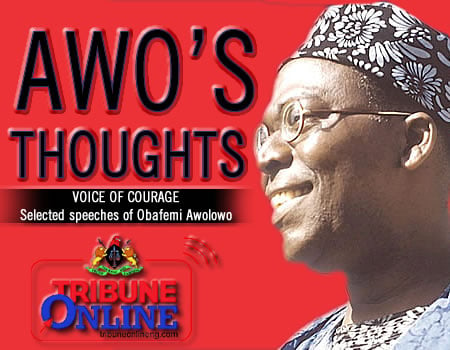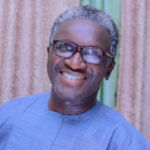CONTINUED FROM LAST WEEK
THREE: Every linguistic group should be made to remain as an undivided unit in anyone constituent State, In other words, no linguistic group should be divided into two or more constituent States.
FOUR: The linguistic groups being brought together must be large enough in population to be administratively viable; but must not be too large territorially to necessitate extensive travelling on the part of the functionaries of the resultant State.
With these considerations in mind, we propose the following seven groupings:
(11) Old Adamawa, Biu, Muri, and Numan Divisions. Population – 2.7 millions..
(12) Bauchi Province and Potiskum Division. Population – 2.7 millions.
(13) Plateau Province, Southern (i.e. non-Hausa speaking) portion of Zaria Province, Akwanga, Lafia, Keffi, and Nasarawa Divisions. Population – 2.6 millions.
(14) Idoma, Igala, and Igbirra Divisions. Population -1.5 millions.
(IS) Abuja, Borgu, Kontagora, and Minna Divisions. Population – 1 million.
(16) Old Ahoada and Ogoni Divisions, together with the municipality of Port-Harcourt. Population -0.8 million.
(17) Old Ikom, Obubra, and Ogoja Divisions. Population – 0.6 million.
At this stage, we would like to make two comments. In the first place, as long as the four factors mentioned above are observed, there is nothing rigid or sacrosanct about the grouping of the minority nations in Northern Nigeria into five constituent States. Any other intelligent combination will do just as well. In the second place, unless we desire to follow the Pakistani model, which we have rejected; or ignore the first of the four factors mentioned above, which would be most unwise; the only course open to us is to group the nine minority nations in Old Ahoada and Ogoni Divisions on the one hand, and Old Ikom, Obubra, and Ogoja Divisions on the other, into two separate constituent States.
It is very noticeable from the figures supplied on pages 236 and 237 that the estimated populations of the minority inguistic groups vary widely. It is, therefore, not impossible (though the feasibility is very remote) for two or more minority national groups to combine to lord it over the others in the constituent State to which they belong, unless there are provisions in the Constitution designed against such an eventuality, To this end, the following constitutional safeguards are proposed:
ONE: There should be provision in the Constitution to the effect that every linguistic group, however small, should have a minimum number of seats, say two, in the State Legislature, in addition to its normal entitlement of representation based on population. By way of illustration, suppose a State with 10 linguistic units has a Legislature of 60 members. Twenty of these would go to the 10 linguistic units at the rate of two each. The remaining 40 would then be distributed among the 10 national groups on the basis of population, but so that every national group would have a share.
TWO: The Constitution should provide that each national group in a constituent State should be constituted into a separate Local Government, and that such a Local Government should be completely autonomous in respect of certain Local Government functions which should be clearly and fully set out in one of the Schedules to the Constitution of the State.
THREE: The Constitution should also provide that any linguistic unit could have its own separate State whenever the Parliament of the composite State signifies by a resolution, supported by the votes of two-thirds of all its members, that such a linguistic unit satisfies our aforestated test of viability. With this proviso, however, that no linguistic unit will be allowed to have a separate constituent’ State unless Parliament is at the same time satisfied that the remainder of the State will also be viable.
Before we pass on to the next topic, we would like to make six points, partly in answer to well-known objections, and partly to dispose of some important issues.
FIRST: It has been objected that the constituent States embracing the Hausa/Fulani, Yoruba, and Ibo are too large, that those embracing the Ijaw, Urhobo, and Nupe are too small, and that they all offend against certain fundamental principles of federalism.
The principles which the objectors have in mind were-formulated by Wheare. We state them as follows:
(I) No one or two States shall be so large in size, population, and wealth as to be able to overrule the other States, and
bend the will of the Central authority to its own; and
(2) No State shall be so small as to be unable to maintain its independence within the sphere of functions allotted to it.
We have already disposed of the objection based on the second principle. We maintain that any constituent State however small can maintain its independence, provided it is able to provide the requisite efficient administrative personnel from among its own nationals. In this connection, we would like to state that we do not at all rule out the possibility of one or more of the small constituent States finding themselves unable or unwilling to perform some of the functions vested in them by the Constitution. In that event, the constituent State concerned could either confer power on the Central Authority to perform the relevant functions on its behalf, or enter into arrangement with a neighbouring constituent State for the joint and more economical performance of such functions. All these are permissible, and a good Federal Constitution should make provisions for them.
The first principle is very sound; but it errs on two vital grounds. First, it runs the risk of colliding, with disastrous consequences, with the multi-lingual principle.
CONTINUES NEXT WEEK
YOU SHOULD NOT MISS THESE HEADLINES FROM NIGERIAN TRIBUNE
Buhari Urges MTN For Quality Service, Downward Price Review In Cost Of Data, Other Services
President Muhammadu Buhari Friday at State House Abuja urged the MTN Group to make the available top-of-the-range service to its Nigerian subscribers…
We Have Not Had Water Supply In Months ― Abeokuta Residents
In spite of the huge investment in the water sector by the government and international organisations, water scarcity has grown to become a perennial nightmare for residents of Abeokuta, the Ogun State capital. Uzodinma sacks General Manager of OCDA, names replacement Uzodinma sacks General Manager of OCDA, names replacement Uzodinma sacks General Manager of OCDA, names replacement Uzodinma sacks General Manager of OCDA, names replacement.
Selfies, video calls and Chinese documentaries: The things you’ll meet onboard Lagos-Ibadan train
The Lagos-Ibadan railway was inaugurated recently for a full paid operation by the Nigerian Railway Corporation after about a year of free test-run. Our reporter joined the train to and fro Lagos from Ibadan and tells his experience in this report…






